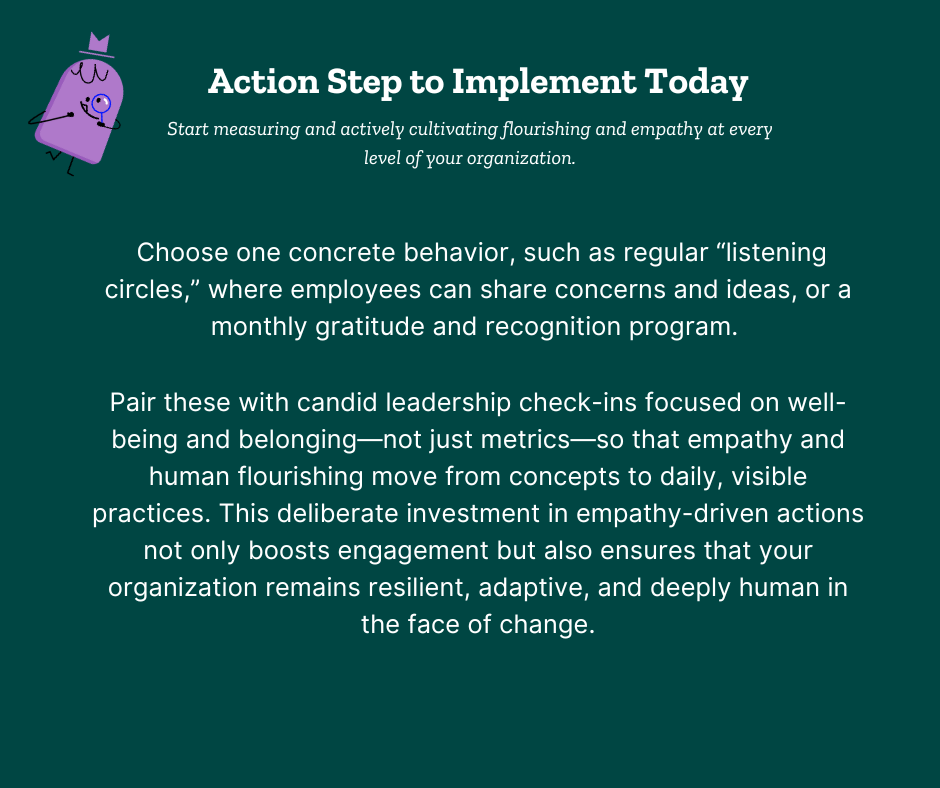The New Metrics of Success: Flourishing, Empathy, and the Future of Work
Step into today’s workplace and you’ll feel it—a current of relentless change powered by AI and digital disruption, challenging every assumption about how organizations operate and succeed. Earlier this week, I attended a thought-provoking talk with Dr. Tyler VanderWeele, founder of Harvard’s Human Flourishing Program. I was struck by the energy in the room and the passion for maintaining and regaining the humanity of work.
In her opening remarks, Karen Seymour, Chief Impact Officer at the World Flourishing Organization, vividly summarized our new reality: transformation is happening at breakneck speed, redefining everything from strategy to daily work. In this climate of excitement and uncertainty, the pressure is on for organizations to engage their people in more holistic, human ways—to not just keep up, but to truly innovate.
What does flourishing mean in the workplace? Is it measured by productivity or performance metrics? Dr. VanderWeele introduced the concept of “flourishing” as a multidimensional state encompassing happiness, health, meaning, character, and relationships. His research, spanning continents and cultures, reveals something surprising: flourishing is driven not just by individual ambition, but by the depth of our connections and the health of our communities. The Global Flourishing Study included 200,000 participants across 22 countries and found that flourishing varies worldwide in unexpected ways. While wealthy nations excel in financial measures, middle-income countries often report higher scores for meaning, character, and relationships. For example, Indonesia, Israel, and the Philippines rank at the top in overall flourishing. The data reveal a negative correlation between national wealth and meaning in life, prompting reflection on how economic development might undermine aspects of flourishing beyond income.
And, while the exact hours vary slightly by country, it’s estimated that most of us will spend roughly a third of our lives at work. Therefore, the workplace and our relationship to our colleagues, the tasks that make up our jobs, how the company’s mission fits into our own values, etc, is a large determinant of flourishing.
Like empathy, flourishing may seem too soft or nebulous as a metric to track. However, it’s just the opposite.
Business Case for Flourishing at Work
Higher employee flourishing predicts better productivity, job satisfaction, and lower turnover and healthcare costs, with data showing well-being is strongly linked to reduced work distraction—a much larger source of lost value than absenteeism.
Encouraging well-being through workplace measurement, positive interventions (such as job crafting, acts of kindness, and character-strength exercises), and fostering cultures of care and trust demonstrably benefits both individuals and organizations.
Where does empathy fit?
Empathy is not called out as a separate flourishing domain, but it is deeply embedded—particularly in how organizations foster relationships, build meaning, and nurture character. It’s the connective tissue that runs through strong organizations and enables us to flourish, both at work and at home.
In high-performing companies, empathy drives psychological safety, enabling employees to voice ideas, share concerns, and participate in creative problem-solving without fear. Leaders who cultivate genuine empathy—not just performative listening—are better equipped to see things from multiple perspectives, create trust, and accelerate learning. In times of massive technological disruption, these relational skills are a competitive advantage.
Empathy isn’t just about kindness
Empathy in this context isn’t just about being nice. It’s not something touchy-feely that “has no business being in the workplace”. It’s about understanding what motivates, frustrates, or inspires colleagues, then using that insight to create cultures of support and accountability. It is essential for driving not just engagement and retention, but actual performance and innovation.
Let’s not lose our humanity now
In a world that’s increasingly polarized, isolating and driven by technology, now is the time to lean into our humanness. AI is now embedded into many of our work processes. Reflecting on AI's massive influence, Dr. VanderWeele urged the audience to consider how technology can both enhance and detract from all domains of flourishing.
As part of his ongoing research, he’s examining how AI may enhance or detract from the six domains of flourishing. His reflections on the topic have left a lasting impression as it aligns with our views here at Cognitive Humanity:
“Ultimately, what does it mean to flourish as a human person? I think we cannot outsource our reasoning, our creativity, our relationships, our joy, and expect to flourish. I think we need to use this technology wisely and carefully.”
We must embed empathy in every system, measure it as rigorously as productivity, and hold it as a non-negotiable standard in daily behaviors and decisions. When employees feel understood, valued, and meaningfully connected, flourishing becomes not just an ideal, but an achievable—and competitive—reality.


